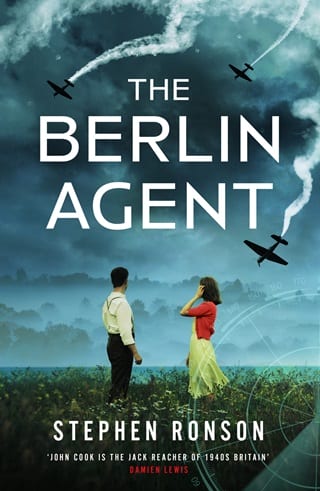12
I left Margaret at dawn, praying I had enough petrol left to get me home. The personal use ration had shrunk to almost nothing. I’d have to top up at the farm, but that would mean using the dyed petrol that was meant to be reserved for agricultural use. The police were cracking down, rightfully so, but it was a chance I’d have to take.
Bill Taylor, my farm manager, was pacing in the yard.
‘Sorry,’ I said, as I climbed out of the van. ‘Got caught up.’
Bill was worried. Normally he was unflappable. He held up a brown envelope.
‘We’ve got the review. Next Wednesday.’
‘I thought we had a month,’ I said.
He pulled out the letter and handed it to me, as if seeing it would help me understand. It was from the War Ag, Crowborough branch, Kent and Sussex sector. The War Ag was a layer of bureaucracy between us farmers and the -Ministry of Food. It had complete control over every aspect of food production in the region.
I read the letter. We were to be inspected. An exhaustive review. Inputs, outputs, utilisation, waste. The results of the inspection would determine our ability to keep control of our farm.
‘They can take it away if they don’t like what they see,’ Bill said.
‘Unlikely,’ I said. Thanks to Bill, our farm was a well-oiled machine.
We walked out, across the fields. The wheat fields were nearest the house, on the high ground where the soil was well drained. We’d tried a new variety, Hold Fast, and it was coming on better than I’d expected. We’d be harvesting in a few days if the weather held. Further from the house, the long field along the Isfield road was green with oats sown the previous November – a gamble that had also paid off. All told, a lot of arable. At Bill’s urging, we’d bought a tractor three years earlier, when everyone else had been sticking to horse-drawn ploughs. It had been a stretch, financially, but it was paying off, as the number of labourers available was shrinking rapidly, along with the supply of horses.
‘I’m worried about Elizabeth,’ Bill said. ‘I’m going to try to get her more involved. We could use the help, and it might be good for her.’
‘Are you sure?’ I asked. ‘Don’t want to put more weight on her shoulders.’
‘Worth a try,’ he said, ‘a wheel to set her shoulder to.’
I’d seen the way she was slipping away, but what I knew about raising children you could put on the back of a postage stamp and still have room to spare.
We pushed our way through a hawthorn hedge, thick with fragrant white blossom. There was meant to be a gap, but it had grown over.
‘I’ll have this cut back,’ Bill said, as we picked our way through, brambles catching at our trousers.
The meadow ran down to the river. We flooded it throughout autumn. The wetter the meadow, the better the grass. The better the grass, the better the hay we could cut. Of course, hay was only useful when you had livestock, and we’d got rid of our cattle months ago, at the direction of the War Ag. The ground was packed hard now, after the dry spring but that wouldn’t last. As soon as the weather changed and the autumn rain came, it would be jelly, good for nothing. The Germans would know that. They’d made the same calculation the previous year when they timed their invasion of Poland – a calendar dictating military manoeuvres in -Europe all the way back to Roman times. Hitler’s generals were as aware of soil conditions in Southern England as I was. They’d have reports covering soil type, rainfall, drainage, all of that. They’d be wanting to get their tanks rolling across my lower meadow within the month, or they’d miss their window.
‘We’ll have to bring this into production,’ Bill said, looking at the meadow with dismay. ‘Everyone I’ve talked to has heard the same thing. If it’s not underwater or sheer rock, it’s got to be ploughed up.’
We walked down to the river. The water was low.
‘They’ll come up the valley,’ I said. ‘Good flat land all the way from the sea.’ We looked down-river. If the blitzkrieg across France was any guide, the attack would be fast-moving divisions of tanks, penetrating the country and encircling our troops. The infantry would follow behind, mopping up.
‘What’ll you do after the invasion?’ I asked Bill. He hadn’t fought in the Great War. He’d been a conchy. Refused to serve. I didn’t agree with his politics, but since he’d come to work for me I’d got to know him as well as I knew any man. People thought the conchies were cowards. A lot of those people could learn a lot from Bill Taylor.
‘Whatever they tell me,’ he replied. ‘They’ll need men who know how to farm.’
I hoped he was right, but I didn’t share his optimism. I’d seen what happened when an army overran a civilian population. It didn’t end well.
‘Maybe use the river,’ he said. ‘Take the rowing boat. Slip away when it’s dark.’
He’d clearly been thinking about it. You could get to the sea, but then what? The Germans had the French ports. You’d have to head further south, past Normandy. Better if there was a fishing boat waiting for you, a mile out, keeping watch.
Bill turned back to the field.
‘The man from the War Ag will want to see progress by the time he visits,’ he said. ‘I’ve been thinking about making a mole. Weld a torpedo shape to an old plough, pull it along underground, make some drainage lines.’
‘Have you got what you need to make it?’ I asked.
‘Reckon so.’
I liked that about Bill. Always thinking of little improvements, putting in the work to make them happen. In my experience, a lot of people have a lot of ideas, but not many of them turn them into action.
 Fullepub
Fullepub 



